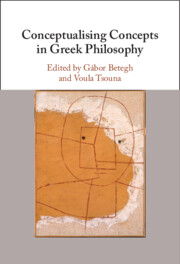61 results
Contributors
-
- Book:
- Conceptualising Concepts in Greek Philosophy
- Published online:
- 25 April 2024
- Print publication:
- 02 May 2024, pp vii-viii
-
- Chapter
- Export citation
Chapter 9 - Epicureans on Preconceptions and Other Concepts
-
-
- Book:
- Conceptualising Concepts in Greek Philosophy
- Published online:
- 25 April 2024
- Print publication:
- 02 May 2024, pp 203-236
-
- Chapter
- Export citation
Bibliography
-
- Book:
- Conceptualising Concepts in Greek Philosophy
- Published online:
- 25 April 2024
- Print publication:
- 02 May 2024, pp 452-475
-
- Chapter
- Export citation
Preface
-
- Book:
- Conceptualising Concepts in Greek Philosophy
- Published online:
- 25 April 2024
- Print publication:
- 02 May 2024, pp ix-xi
-
- Chapter
- Export citation
Copyright page
-
- Book:
- Conceptualising Concepts in Greek Philosophy
- Published online:
- 25 April 2024
- Print publication:
- 02 May 2024, pp iv-iv
-
- Chapter
- Export citation
Contents
-
- Book:
- Conceptualising Concepts in Greek Philosophy
- Published online:
- 25 April 2024
- Print publication:
- 02 May 2024, pp v-vi
-
- Chapter
- Export citation
Introduction
-
- Book:
- Conceptualising Concepts in Greek Philosophy
- Published online:
- 25 April 2024
- Print publication:
- 02 May 2024, pp 1-15
-
- Chapter
- Export citation
Index
-
- Book:
- Conceptualising Concepts in Greek Philosophy
- Published online:
- 25 April 2024
- Print publication:
- 02 May 2024, pp 476-484
-
- Chapter
- Export citation
Abbreviations
-
- Book:
- Conceptualising Concepts in Greek Philosophy
- Published online:
- 25 April 2024
- Print publication:
- 02 May 2024, pp xii-xx
-
- Chapter
- Export citation

Conceptualising Concepts in Greek Philosophy
-
- Published online:
- 25 April 2024
- Print publication:
- 02 May 2024
Chapter 2 - The Prologue (153a1–159a10)
-
- Book:
- Plato's Charmides
- Published online:
- 10 February 2022
- Print publication:
- 17 February 2022, pp 57-106
-
- Chapter
-
- You have access
- Open access
- HTML
- Export citation
Bibliography
-
- Book:
- Plato's Charmides
- Published online:
- 10 February 2022
- Print publication:
- 17 February 2022, pp 326-338
-
- Chapter
-
- You have access
- Open access
- HTML
- Export citation
Chapter 7 - Critias’ Speech
-
- Book:
- Plato's Charmides
- Published online:
- 10 February 2022
- Print publication:
- 17 February 2022, pp 159-169
-
- Chapter
-
- You have access
- Open access
- HTML
- Export citation
Chapter 12 - The Epilogue (175a9–176d5)
-
- Book:
- Plato's Charmides
- Published online:
- 10 February 2022
- Print publication:
- 17 February 2022, pp 273-299
-
- Chapter
-
- You have access
- Open access
- HTML
- Export citation
Chapter 4 - Charmides’ Second Definition
-
- Book:
- Plato's Charmides
- Published online:
- 10 February 2022
- Print publication:
- 17 February 2022, pp 124-134
-
- Chapter
-
- You have access
- Open access
- HTML
- Export citation
Preface and Acknowledgements
-
- Book:
- Plato's Charmides
- Published online:
- 10 February 2022
- Print publication:
- 17 February 2022, pp ix-xii
-
- Chapter
-
- You have access
- Open access
- HTML
- Export citation
Chapter 8 - Socrates and Critias Debate the Technê Analogy
-
- Book:
- Plato's Charmides
- Published online:
- 10 February 2022
- Print publication:
- 17 February 2022, pp 170-186
-
- Chapter
-
- You have access
- Open access
- HTML
- Export citation
Additional material
-
- Book:
- Plato's Charmides
- Published online:
- 10 February 2022
- Print publication:
- 17 February 2022, pp vii-viii
-
- Chapter
-
- You have access
- Open access
- HTML
- Export citation
Chapter 6 - Enter Critias
-
- Book:
- Plato's Charmides
- Published online:
- 10 February 2022
- Print publication:
- 17 February 2022, pp 144-158
-
- Chapter
-
- You have access
- Open access
- HTML
- Export citation
Copyright page
-
- Book:
- Plato's Charmides
- Published online:
- 10 February 2022
- Print publication:
- 17 February 2022, pp iv-iv
-
- Chapter
-
- You have access
- Open access
- HTML
- Export citation



